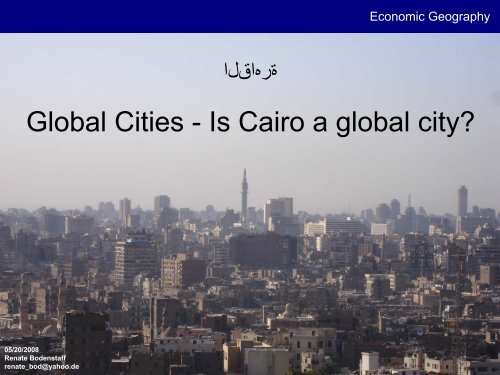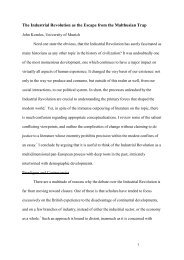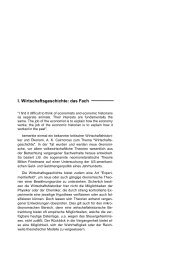Global Cities: Cairo
Global Cities: Cairo
Global Cities: Cairo
- No tags were found...
You also want an ePaper? Increase the reach of your titles
YUMPU automatically turns print PDFs into web optimized ePapers that Google loves.
<strong>Cairo</strong> - PopulationEconomic Geography1Source: http://www.demographia.com/db-worldua.pdf5
<strong>Cairo</strong> – UrbanizationEconomic Geography1‣ Urbanization has been very rapid.‣ The increase in the urban area was not as fast as thepopulation increase.‣ Within the last three decades, the total built-up areaincreased more than 270%60050040030020010019001950197019802000Source: http://siteresources.worldbank.org/INTHOUSINGLAND/Resources/339552-1180637750307/<strong>Cairo</strong>.pdf6
<strong>Cairo</strong> – UrbanizationEconomic Geography1Informal settlementDef.: Districts built on the outskirts or inside the urban agglomeration of the city in violation of laws.This violation includes building on agricultural lands which is prohibited in Egypt or building on apublic land. In both cases, building takes place without permissions and without consideringplanning standards.Source: http://siteresources.worldbank.org/INTHOUSINGLAND/Resources/339552-1180637750307/<strong>Cairo</strong>.pdf 7
<strong>Cairo</strong> – UrbanizationEconomic Geography1Informal settlementThe City of the deadDue to the lack of satisfactory and affordable housing for the rapidly growing population many poor Egyptianswere forced to live in houses amongst cemeteries called „The City of the dead.“ Among these cemeteries live acommunity of Egypt’s urban poor, forming an illegal but tolerated, separate society. More than five millionEgyptians live in these cemeteries, and have formed their own enterprises.Source: www.learnquebec.ca/en/content/curriculum/social_sciences/sec_geography/resources/metropolises/cairo.html8
<strong>Cairo</strong> – UrbanizationEconomic Geography1Satellite citiesSource: http://siteresources.worldbank.org/INTHOUSINGLAND/Resources/339552-1180637750307/<strong>Cairo</strong>.pdf‣ Decentralization has been promoted by government efforts to stimulate economic development,to reduce population density and traffic congestion in <strong>Cairo</strong> and to stem the growth of slumareas.‣ The new towns are on or beyond the edge of the urbanization and were intended to becomeself-sufficient and attract employment.‣ The government provides the roads and other infrastructure.‣ Large manufacturing plants, warehouses and offices were built in the new cities, which wouldhave been much more costly and even impossible to develop inside older <strong>Cairo</strong>.‣ In addition to new towns, the government has developed an information technology city (“SmartVillage”).9
<strong>Cairo</strong> – ProblemsEconomic Geography1Infrastructure‣ Extensive water systems have allowed the city to expand east into the desert‣ Poor passenger transport system: only 4 km of metro/1 million inhabitants(inhabitants (Paris: 150 km/1 million‣ Serious traffic congestions: 80% of intersections in centre <strong>Cairo</strong> and Giza are saturatedEnvironmental problems‣ <strong>Cairo</strong> has some of the most polluted air in the world: the air quality is incredibly poorSource: http://www.ppionline.org/ppi_ci.cfm?knlgAreaID=108&subsecID=900003&contentID=25401710
<strong>Cairo</strong> – Citizen‘s satisfactionEconomic Geography1Citizen’s satisfaction by selected servicesSource: http://siteresources.worldbank.org/INTHOUSINGLAND/Resources/339552-1180637750307/<strong>Cairo</strong>.pdf11
<strong>Global</strong> <strong>Cities</strong> – Definition and CriteriaEconomic Geography2<strong>Global</strong> <strong>Cities</strong>Def.: <strong>Global</strong> cities function as regional or global nodes in the world economy. These cities concentratecommand functions and are key locations for finance and specialized services for firms (Sassen).Criteria and indicatorsSource: Izak J. van der Merwe (2004): The global cities of Sub-Sahara Africa: Fact or fiction. Urban Forum 15: p. 36-47‣ Present studies of globalization and global cities have been biased towards western core countries‣ Africa is by far the continent with the fewest global cities or world cities in any of the classifications.This situation stems from the distinctive urban traditions and the urban imprints of the strong colonialheritage: In the 20th century Africa’s role in the world economy was mostly to supply raw materialsand import consumer goods.It is questionable whether the global city criteria apply to non first world countries.12
<strong>Cairo</strong> – A global city ?Economic Geography38 International flights to destinations in Africa. 9 International flights to destinations in the Middle East.Source: J Gugler (2004): World <strong>Cities</strong> beyond the West: <strong>Global</strong>ization, Development, and Inequality. Cambridge University Press: p. 1-2613
<strong>Cairo</strong> – A global city ?Economic Geography<strong>Global</strong> network connectivity of West Asian/North African <strong>Cities</strong>3ABU = Abu Dhabi; BEI = Beirut; CAS = Casablanca; CAI = <strong>Cairo</strong>; DUB = Dubai; IST = Istanbul;JED = Jeddah;KUW = Kuwait City; MAN = Manama; NIC = Nicosia; RIY = Riyadh; TEL = Tel Aviv.Source: Taylor, P.J. (2001): West Asian/North African <strong>Cities</strong> in the World City Network.The Arab World Geographer 4 (3). p. 146-159‣ Relatively low connectivity does not meanbeing unconnected‣ Notable inter-city relations between West Asian/ NorthAfrican <strong>Cities</strong>‣ Some cities act as ‘gateway cities’ with no global commandfunctions but with relatively high connectivity and somenotable ‘network power’15
<strong>Cairo</strong> – A global city ?Economic GeographySpatial Economy of <strong>Cairo</strong>‣ <strong>Cairo</strong> is a primate city‣ Source of 43% of the public sector employment and 40% of industrial private sector employment‣ Accounts for over 50% of national GDP and 40% of manufacturing outputs3Source: http://www.oecd.org/dataoecd/34/61/36739719.pdf16
<strong>Cairo</strong> – A global city ?Economic GeographyEconomic output of the largest cities and urban areas in 20053GDP per capitain US $63.00061.00059.4009.000(2007 Source: http://www.citymayors.com/statistics/richest-cities-2005.html (report by PricewaterhouseCoopers17
<strong>Cairo</strong> – A global city ?Economic Geography(CDI) City Development Index‣ The CDI is the best single measure of thelevel of development in cities (developed by(UNCHS3‣ The CDI …… is defined at the city level and could alsobe taken as a measure of average wellbeingand access to urban facilities byindividuals.… has been cited as a good index of urbanpoverty and urban governance. Health,education, and infrastructure componentsare particularly good variables formeasuring poverty outcomes in cities.Similarly infrastructure, waste and cityproduct components are key variables formeasuring the effectiveness of governancein cities.… correlates strongly with the city product:other things being similar, a high-incomecity will have a higher CDI.Source: http://ww2.unhabitat.org/Istanbul+5/116.pdf‣ <strong>Cairo</strong> scored 63.4 (extrapolated figure, since(available data was not18
<strong>Cairo</strong> – A global city ?Economic GeographyThe World Bank Group – Doing Business3Doing Business in Egypt 2008 measures the ways in which government regulations enhance businessactivity or restrain it at the sub national level.The data set covers 178 economies: 46 in Sub-Saharan Africa, 31 in Latin America and the Caribbean,28 in Eastern Europe and Central Asia, 24 in East Asia and Pacific, 17 in the Middle East and North Africaand 8 in South Asia-as well as 24 OECD high-income economies as benchmarks.This report allows a comparison of the economies not only with one another but also with the “best practice”economy for each indicator.Source:http://www.doingbusiness.org/documents/FullReport/2008/DB08_Full_Report.pdf19
Bidding for `global city` statusEconomic GeographyBidding for ‘global city‘ status: a prescription for sustaining <strong>Cairo</strong>‘s financial health‣ <strong>Cairo</strong> has not yet qualified for ‘global city’ status due to:• the lack of a strategic vision• the paucity of financial resources• a limited institutional capacity at the local government level‣ <strong>Cairo</strong> has been eclipsed by cities like Dubai and Johannesburg, where sound strategic planninghas laid the foundation for “up and coming” global cities.4‣ <strong>Cairo</strong> has failed to attract major organizations and financial institutions to locate there.Financial resources of <strong>Cairo</strong>’s local government (CLG) are stretched to the limit. The CLG is unableto deliver high quality public services and infrastructure unless it provides an enabling framework,which would attract FDI, multi-national regional headquarters, and world events to the city so as tomaximize its local revenue base.‣ The tragic events of 9/11 have cast a cloud of uncertainty over Egypt(Pound • Foreign Direct Investment (FDI) fell by 25% (Stock Exchange, devalued• Tourist inflows were hit hard• almost every sector of the city economy is suffering a recession‣ With the exception of representative offices of all the UN organizations/programs, the World Bank,the International Monetary Found, and the Universal Postal Union, the list of <strong>Cairo</strong> basedinternational organizations and institutions is far from impressive.20
Bidding for ‘global city’ statusEconomic GeographySWOT analysis of <strong>Cairo</strong>Strengths:‣ Internal political stability, which is a necessary condition for a thriving business environment‣ Free Trade Agreements (FTA) with a couple of Arab States‣ Human capital: research scientists, reasonable pool of multi-lingual professionals, graduates from thebusiness and economics department of AUC‣ Remarkable development of the city’s information and communications technology infrastructure4Weakness:‣ Egypt’s lingering bureaucracy‣ Low level of coordination and synchronization among different government agencies andbetween government agencies and private business(governance ‣ The weak CLG financial base and institutional capacity (weak‣ Slow litigation processOpportunities:‣ FTAs hold the potential for transforming <strong>Cairo</strong> into a nexus for trade between the US, Europe,the Arab World and Africa‣ <strong>Cairo</strong> is a serious contender in the race for the communications and information technology (CIT) hub(p.a of the Middle East and Africa (growing rate > 17%‣ Enormous proven natural gas reserves of Egypt bode well for the energy sector‣ The opening up of the insurance sector holds a lot of promise for new multinational businessThreats:‣ Regional political instability has historically scared off investors and will continue to do so unless theMiddle East conflict is fairly resolved soon‣ Environmental pollution and low liveability standards in the city centre21
ConclusionEconomic GeographyConclusion‣ It remains questionable whether global city criteria apply to cities in non first world countries like<strong>Cairo</strong>.‣ Applying the commonly used global city criteria shows that <strong>Cairo</strong> hasn‘t reached ‘global city‘status yet, but has the potential.‣ <strong>Cairo</strong> is equally well connected with Africa and the Middle East. But it’s opportunities havebeen severely limited by political conflicts in the Middle East that culminated in a series of wars.5‣ Duties and responsibilities to be done in order to reach global city status:‣ Importance of strategic vision:Creation of enabling conditions that will serve the forces of globalization and that help<strong>Cairo</strong> to succeed in the competition for global capital:• excellent communications• well-functioning infrastructure and urban services• skilled labour force• efficient transportation systems• availability of affordable housing• access to educational and recreational facilities• Good urban governance:Strengthening institutional capacity and devolving resource mobilization powers from thecentral to the local level of government.‣ Marketing the city’s assets, i.e. through public and private partnerships.22
ReferencesEconomic Geography6• El-Khishin, K. (2003): Bidding for ‘global city’ status: a prescription for sustaining <strong>Cairo</strong>’s financial health.<strong>Cities</strong> 20(2): p. 129-134• Gugler, J. (2004): World <strong>Cities</strong> beyond the West: <strong>Global</strong>ization, Development, and Inequality.Cambridge University Press: p. 1-26• Van der Merwe, I.J. (2004): The global cities of Sub-Sahara Africa: Fact or fiction. Urban Forum 15: p. 36-47• Taylor, P.J. (2001): West Asian/North African <strong>Cities</strong> in the World City Network: A <strong>Global</strong> Analysis ofDependence, Integration and Autonomy. The Arab World Geographer 4 (3). p. 146-159• El Kouedi, H. (2007): Tackling the shelter challenge of cities,- <strong>Cairo</strong>, Egypt. World Bank 04/30/2007http://siteresources.worldbank.org/INTHOUSINGLAND/Resources/339552-1180637750307/<strong>Cairo</strong>.pdf6• Demographia World Urban Areas (2007):http://www.demographia.com/db-worldua.pdf• <strong>Cairo</strong>: Megacity - Mega Problems:http://www.isl.uni-karlsruhe.de/vrl/ResEng/global_trends/cairo/index.htm• Progressive Policy Institute:http://www.ppionline.org/ppi_ci.cfm?knlgAreaID=108&subsecID=900003&contentID=254017• African Economic Outlook 2005-2006:http://www.oecd.org/dataoecd/34/61/36739719.pdf• City Mayors Statistics:(2007 http://www.citymayors.com/statistics/richest-cities-2005.html (report by PricewaterhouseCoopers• Doing Business 2008:http://www.doingbusiness.org/documents/FullReport/2008/DB08_Full_Report.pdf• The City Development Index (CDI):http://ww2.unhabitat.org/Istanbul+5/116.pdf23








